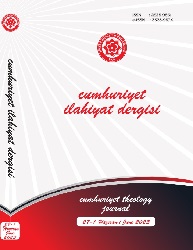Kur’an’daki “İn Küntüm” İfadesinin Gramatik ve Problematik Yorumları Üzerine Bir İnceleme
An Investigation on the Grammatical and Problematic Interpretations of the Expression 'in Kuntum' in the Qur’ān
Author(s): Süleyman NarolSubject(s): Morphology, Syntax, Hermeneutics, Qur’anic studies
Published by: Cumhuriyet Üniversitesi İlahyat Fakültesi
Keywords: Qur’ānic Exegesis; in Kuntum; Interpretation; Grammatical; Problematic;
Summary/Abstract: When the Qur’ān was revealed, it primarily used the language of the first addressees, Arabic, in the most impressive and understandable way to convey its message. In doing so, it used all the possibilities allowed by the range of meanings and rules of the language. While the Qur’ān conveys its message to its addressees, it sometimes uses long expressions, sometimes quite concise ones, and even a word or preposition in some places. Due to the structure of the language, the words, the smallest component of the language, and, peculiar to it, even the prepositions and letters, due to the morphological structure of Arabic, are the elements that completely affect the meaning. Like many other letters and prepositions in Arabic, the preposition “ْ إن ” handled in this study undoubtedly has an important effect on the meaning. We generally encounter, in many verses of the Qur’ān, the use of this preposition in the sense of condition, which is the most basic meaning in the language. In addition to this meaning, the negative, emphasis, and causal meanings are also the other uses of this preposition according to the integrity of Qur’ān and the context of the verses. Apart from the meaning of condition as the basic meaning of the preposition “ْ إن ” in the Qur’ān, whether the meaning of cause/ta’līl exists in the language and this meaning is used in the Qur’ān is basically an issue discussed by the Basra and Kūfa language schools, the issue has still been discussed by the exegetes as well due to its effects on the meaning. It is quite important for correctly understanding the Qur’ān to determine the effect of the preposition “ْ إن ” on the meaning when it is mentioned in the Qur’ān and to give the appropriate meaning to the context. This paper is also important in that it aims to deal with the effect of the preposition in question on the meaning in the verses where there are controversial approaches and in the example of the use of the verb form “ْ مْ إِن ُ ت ن ُ ك”. In the study, the approaches of the exegetes to the verses on which there are problematic approaches are transferred from the major interpretations written from the early period to the modern period and some evaluations are included with an analytical view. Although the Basra language school and some exegetes following them say that “ إنْ ”does not mean causation, the linguists of Kūfa and the exegetes following the same line have stated that it also means that, and they showed examples from the āyāt (verses) and hadiths that it is not correct to use this preposition in the meaning of condition in some contexts in the Qur’ān. For example, they argued that the use of the expression “ مْ إِنْ ُ ت ن ُ ك”used about angels in a verse in Sūrat al-Baqara 2/31, as “if you are of the truthful” would raise doubts as to whether they were truthful or not and this would contradict their qualifications as angels. On the other hand, they argued that giving a conditional meaning to “ مْ إِنْ ُ ت ن ُ ك”at the end of the verses starting as “if you are believers” or the ones in which the believers is directly addressed as in al-Baqara, 2/278 and Āl ‘Imrān 3/139, would cause a contradiction between the beginning and the end of the verse, and that this style would cause a problem on the ground of belief about Allah. In the same way, some linguists argue that giving the meaning of conditions to some verses poses a problem in terms of the context and the style of the Qur’ān, and they explain this situation through al-Baqara 2/23 and similar verses. For, although it is certain that the polytheists doubted about the Qur’ān in the verse in question according to them, the statement “If you are in doubt about the Qur’ān, bring a sūra (chapter) like it” fits neither context nor fact. The Basra language school who constitutes the majority and think that the expression “ مْ إِنْ ُ ت ن ُ ك”mostly found at the end of the verses in the Qur’ān includes the meaning of condition, and the other exegetes following them have systematically added the meaning of condition to all of the verses in which the aforementioned preposition is used, and in cases where the meaning of condition is problematic or subject to some objections in terms of context, they have resorted to various linguistic explanations such as omission (hazf), precedence-postponement (taqdīm-ta’khīr) and metaphor. As far as it can be determined in this study, except for some scholars of wujūh and naẓā’ir, there was no one who constantly gave the meaning of cause in the verses where the meaning of condition is open to discussion, whereas some exegetes gave the meaning of condition or cause/ta’līl depending on the context and used all the possibilities of the language by acting more freely. However, it has not gone unnoticed that they present a problematic interpretation style by displaying different approaches in similar āyāt (verses) that come in the same context.
Journal: Cumhuriyet İlahiyat Dergisi
- Issue Year: 27/2023
- Issue No: 1
- Page Range: 46-60
- Page Count: 15
- Language: Turkish

